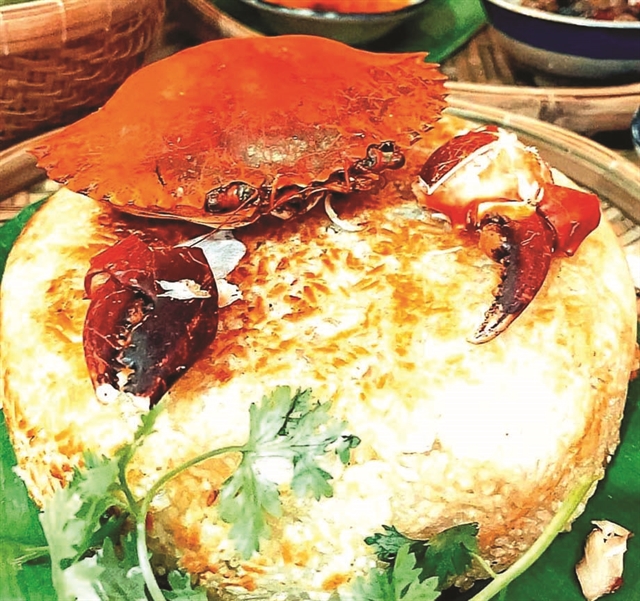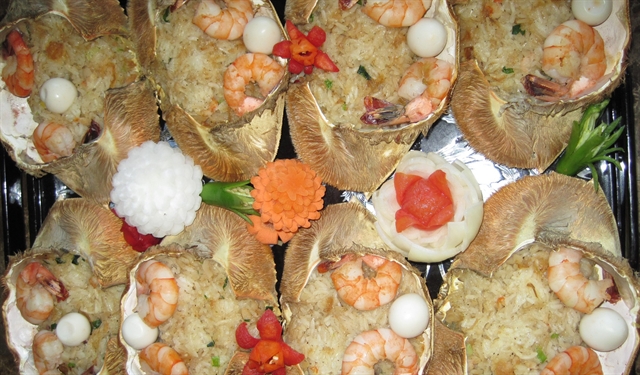Although I’ve known of the dish for a long time, I've never had the chance to enjoy it until recently during my trip to visit my aunt in Cà Mau who cooked me this speciality.
Duy An
A trip to Cà Mau Province is the perfect place to try some amazing seafood. And while the area is famous for roasted oysters, xôi cua (sticky rice with crab) is certainly a must-try treat.
Although I’ve known of the dish for a long time, I've never had the chance to enjoy it until recently during my trip to visit my aunt in Cà Mau who cooked me this speciality.
My aunt Nguyễn Thị Hải said Năm Căn District in Cà Mau is famous for quality and tasty crabs so she asked her friend there to find me the best crabs which were so fresh that I can almost smell the sea.

'Xôi cua', a special dish popular with diners. Photo Kim Quán
Apart from crab, sticky rice from Điện Biên Province in the northwest region, plays an important role in making the dish tasty and delicious, said Hải.
“The Điện Biên sticky rice has been grown on hilly land so it is soft and fragrant compared with others, Hải said.
"When steamed, each rice grain is separate but still connected with each other. It never becomes too wet.”
She soaked one kilogram of sticky rice for eight hours over night. When the next day came, she steamed the rice and the crabs.

Sticky rice with crab dish, made by Cà Mau locals. Photo baocamau.com.vn
She asked me to help her to take out meat from the crab to put it in a plate. Very different from crab I had bought in Hà Nội, where its meat is not as fragrant as it is in Cà Mau.
Other ingredients include dried onion, Phú Quốc fish sauce, broth mix, chili and pepper.
After frying the minced dried onion in a pan over medium fire, Hải put the crab meat in the pan and regularly stirred it for several minutes before pouring fish sauce and broth in.

'Xôi cua' is nicely decorated. Photo Lê Thương
The sticky rice should be steamed twice to be softer, Hải told me.
She quickly took several table spoons of steamed sticky rice out of the steamer and put it in the crab’s shell then topped it with fried crab meat, chili and pepper.
She placed the dish on a plate then arranged two big claws of the crab on either side.
“The dish is more enjoyable when eaten hot because crab meat will have a fishy smell if eaten cold," she said.
It was love at first taste because this was the first time I have had a chance to enjoy xôi cua cooked by a Cà Mau resident.
Usually I did not like to eat sticky rice because I find it a little hot but this dish is different. The blend of the sticky rice is fragrant and soft while the crab meat is fresh and sweet.

'Xôi cua củ năng' (sticky rice with crab and water chestnut) is also tasty and delicious. Photo gocdiepdung.worldpress.com
During my stay, Hải also cooked me miến cua (vermicelli with crab), a popular dish that every Vietnamese housewife knows how to prepare so I thought the dish would not be so attractive but I was wrong.
When Hải brought me a bowl of miến cua, which is yellow colour from the fried crab fat used as a broth to give a bowl of quality soup and also crab meat topped with fresh onions, particularly laksa leaves.
The laksa leaves help to give the dish an aromatic flavour.
I asked Hải about recipes of xôi cua and several other specialties of Cà Mau so as to cook it at my home in Hà Nội for my family and friends to try. VNS